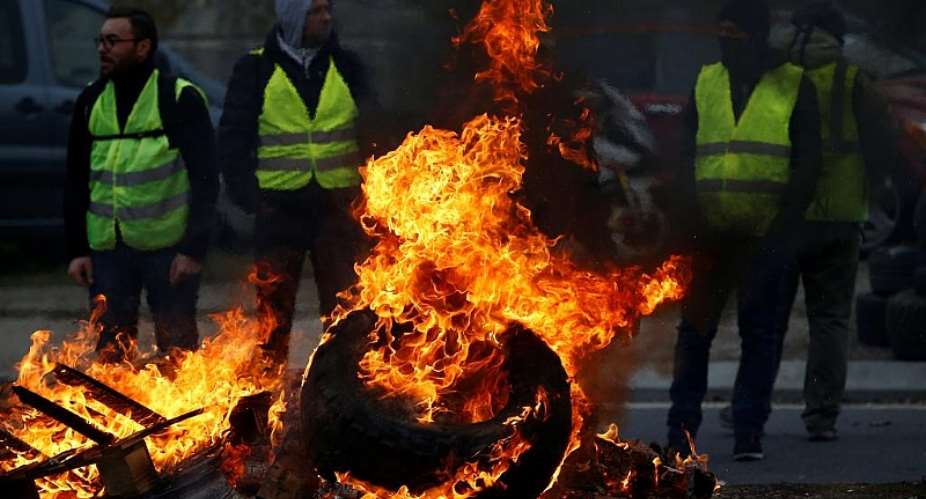The French government has vowed to stick with its fuel tax plans, despite protests across the country calling for a change of tack. Authorities insist that high fuel taxes are necessary to steer the country away from its reliance on oil, however protesters argue their purchasing power is more important than a fast energy transition.
"We are making unpopular choices, but we have to, in order to disintoxicate ourselves from petrol," French government spokesperson Benjamin Grivaux told national radio RMC Monday.
These unpopular choices have seen the price of diesel, the most commonly used fuel in French cars, shoot up by around 23 percent over the past 12 months to an average of €1.51 per litre.
The government insists it has "a duty" to transform the French economy by making it less oil-dependent, yet the tax hikes aimed at encouraging drivers to embrace less-polluting cars, have hit a raw nerve with voters in rural areas.
According to a poll published in the Journal de Dimanche Sunday, 62 percent of those questioned said they preferred their purchasing power to a fast energy transition.
"A lot of people cannot do anything without their cars. Many of them would like to be environmentally conscious but they really can't afford it," explains Philippe Moreau-Chevrolet, a communication specialist and teacher at Sciences Po University in Paris.
Cars for work
"These people are saying: 'we are all for the ecological transition, but how do we do it? We need our cars to go to work, and we need our work because we don't have enough money to make ends meet at the end of the month'," he told RFI.
Angry motorists and other demonstrators blocked roads across France on Saturday in a grassroots campaign dubbed the “Yellow Vests” that saw 288,000 take to streets acorss France.
"It is like an anger which is expressed, without any leader," continues Moreau-Chevrolet, "it is a confrontation between the government and a large part of the French public which doesn't feel as if they are represented by the government anymore."
More than 400 people have been injured since the fuel protests began Saturday, with one female protester killed after being struck when a driver surrounded by demonstrators panicked and accelerated.
The movement, which began on the Internet, has now mushroomed into widespread frustration against the president's economic reforms.
Out of touch
Macron, a former investment banker who has pushed through a series of reforms aimed at bolstering economic growth, is increasingly seen as out of touch with ordinary people. His approval ratings have dipped to as low as 21 percent in recent months.
French Prime Minister Edouard Philippe on Sunday evening said the government acknowledged the "suffering" expressed by the protests, and spokesperson Benjamin Grivaux reiterated that same sentiment on Monday.
Yet, the tax on diesel is to stay. "A government that always changes its stance, would not lead France in the right direction," Philippe told France 2 television.
That direction is towards a cleaner environment, geared towards renewables and away from fossil fuels.
Worlds apart
The policy is creating a split between those in favour of the fight against climate change and those who want more policies to help household incomes.
"There are two different worlds: One world in the big cities is all in favour of the energy transition," comments Moreau-Chevrolet, "they are transitioning already from the car to the bicycle."
This transition however is a "luxury" for the rest of the French population, who live outside the cities, he says.
"If the government doesn't understand that, it will cut itself off from these people."





 Dumsor: Energy sector ‘shepherdless’ – Nana Amoasi VII
Dumsor: Energy sector ‘shepherdless’ – Nana Amoasi VII
 Train accident: Four more grabbed and remanded
Train accident: Four more grabbed and remanded
 Gov't to consolidate cash waterfall revenue collection accounts
Gov't to consolidate cash waterfall revenue collection accounts
 Gov't to settle lump sum for retired teachers by April 27
Gov't to settle lump sum for retired teachers by April 27
 Former PPA CEO granted GH₵4million bail
Former PPA CEO granted GH₵4million bail
 Dumsor: The darkness has exposed you; you’ll go down as the worst in Ghana’s his...
Dumsor: The darkness has exposed you; you’ll go down as the worst in Ghana’s his...
 Dumsor: The ‘incompetent’ person provided a timetable whiles those who came to s...
Dumsor: The ‘incompetent’ person provided a timetable whiles those who came to s...
 Defend, ensure NPP’s good works are ‘sold’ and highlight the ‘bad’ state of the ...
Defend, ensure NPP’s good works are ‘sold’ and highlight the ‘bad’ state of the ...
 Bawumia will rank high ahead of Mahama in any anti-corruption test — Salam Musta...
Bawumia will rank high ahead of Mahama in any anti-corruption test — Salam Musta...
 NPP trying to bribe us but we‘ll not trade our integrity on the altar of corrupt...
NPP trying to bribe us but we‘ll not trade our integrity on the altar of corrupt...
